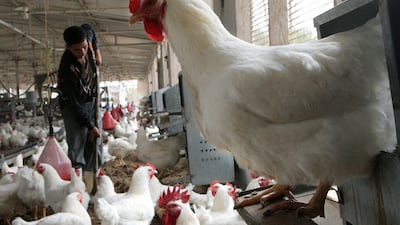After steadily rising over the past year, chicken prices in Egypt fell for the first time this week following the government's import of more than 100,000 tonnes of frozen chicken from Brazil.
The imported chicken went on sale early last week at outlets operated by the Ministry of Supply and the armed forces, which sell food at discounted rates to low-income Egyptians, and at chain hypermarkets.
Demand for the frozen chicken, which costs about 35 per cent less than fresh, locally raised poultry, was high, especially because recent price increases have made beef and chicken unaffordable for many.
“We laid out the chicken in the market’s fridges on Thursday; by Saturday, there wasn’t one left and we had to restock,” Mohamed Omar, a worker at a hypermarket in Cairo’s Maadi district, told The National.
By Monday morning, sellers of local birds had lowered their prices by about 10 Egyptian pounds.
Chicken prices have increased by a larger percentage than other food items. Last year, a shortage of feed created by government import restrictions led many producers to quit the industry, resulting in a drop in supply that in turn raised prices.
Poultry farmers have warned for some time that the industry is on the verge of collapse and have repeatedly asked the government to step in and subsidise corn and soybeans, the two main components of chicken feed.
The government has advised them to instead adjust their profit margins and accused local producers, especially large-scale farms, of profiteering.
“Farmers were repeatedly told that if they did not stabilise prices, the government would have to step in,” Abdelaziz El Sayed, president of the poultry division of the Cairo Chamber of Commerce, told The National.
“It’s important to note that it did not step in to punish or intimidate anyone. Their decision to close down or lower supply created a gap in the market that had to be filled, especially since we’re one month away from Ramadan.
“It was not unreasonable to ask them to limit their profits at a trying time for the country and its economy. They did not listen and decided to continue hiking prices.”
Farmers say the cost of importing feed is too high to sustain operations.
vice president of the Egyptian Poultry Association
“The main obstacle local farmers are facing is the astronomical prices they have to pay to import chicken feed,” Tharwat El Zeity, vice president of the Egyptian Poultry Association, which represents the private sector’s interests, said during a televised roundtable discussion on Saturday.
“Seventy per cent of our costs go towards feeding the animals — it’s really the most essential aspect. So until there are more affordable means of doing that, there will remain a gap that will have to be filled by imported chickens.”
The government usually buys chicken from Brazil to bring down prices before Ramadan, when Egyptians’ food consumption typically increases, and this year it has doubled its imports to fill the gap left by the loss of local supplies.
Last year, it imported an average of 50,000 tonnes of chicken a month. Egyptians consume an average of 180,000 tonnes per month.
“We will keep importing this amount until the local industry stabilises,” Mr El Sayed said.
“We support local industry, but sometimes it takes some hits and then we can rebuild it afterwards. Our primary concern right now is citizens.”
However, it is highly unlikely that prices will ever return to what they were before, he said.
The agriculture ministry said it had increased the planting of corn and soybeans late last year to supply poultry farmers with cheaper feed, and it is also looking into alternatives.
It will be a few months, however, before it will have an effect on the local industry.
Mr El Sayed said the government has repeatedly issued tenders for small lots of corn and soybeans that it intends to expand in coming weeks.
It has also periodically released shipments of corn and soybeans that were held up at ports awaiting the securing of foreign currency to release them.
Egypt has been facing a shortage of dollars since the Ukraine war pushed up global food and fuel prices, which has seriously affected its imports.


